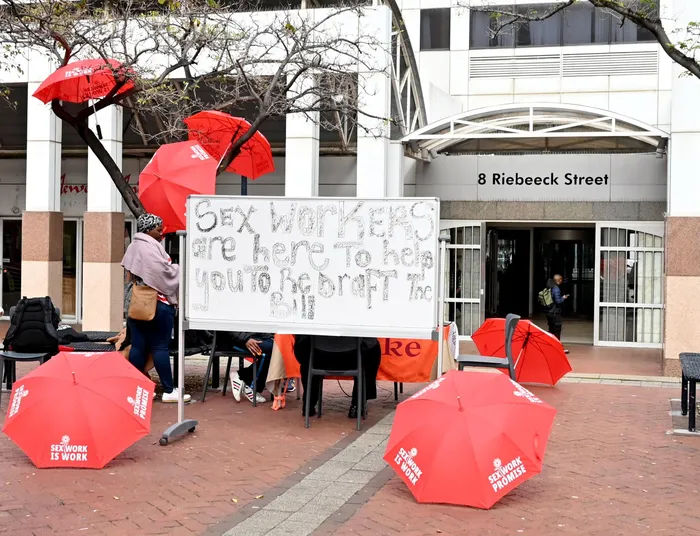
An activation on international sex workers day earlier this year in Cape Town. The Western Cape High Court has admitted the Treatment Action Campaign (TAC) and Sonke Gender Justice as amici curiae (friends of the court) in a pivotal case challenging the criminalisation of sex work in South Africa.
Image: Ayanda Ndamane / Independent Newspapers
The Western Cape High Court has admitted the Treatment Action Campaign (TAC) and Sonke Gender Justice as amici curiae (friends of the court) in a pivotal case challenging the criminalisation of sex work in South Africa.
A sex worker, identified as SH and the Sex Workers Education and Advocacy Taskforce (SWEAT) have brought a case against the Minister of Justice and Correctional Services and others, seeking to have provisions that criminalise sex work declared unconstitutional. The main hearing is scheduled to take place from May 18 to 20 2026 in Cape Town.
TAC and Sonke, represented by SECTION27, applied to intervene in the matter during proceedings held this week. The court ruled in their favour on Wednesday.
In a statement, SECTION27 said: “TAC and Sonke will give evidence in the main application that demonstrates the impact of the criminalisation of sex work on the constitutional right to have access to healthcare services, including reproductive healthcare. The evidence presented by TAC and Sonke shows that sex workers are frequently denied access to essential health services and that their interactions with the public health system are shaped by stigma, criminalisation, and fear of police surveillance.”
The organisations argue that criminalisation undermines sex workers’ constitutional right to health and contributes to poorer health outcomes. They further contend that it directly impacts personal safety and protection from violence.
“We will also argue that the criminalisation of sex work has an impact on the right to freedom and security of the person and freedom from violence. For sex workers, criminalisation fosters an environment of greater vulnerability to violence, often perpetrated by those in positions of authority. Since sex work is illegal, sex workers are reluctant to report assaults for fear of being charged with sex work-related offences,” SECTION27 said.
The statement added that evidence will be led on sex workers’ lack of trust in the police and cases of sexual violence and rape allegedly perpetrated by law enforcement officials.
According to SECTION27, TAC and Sonke will also highlight the discriminatory enforcement of sex work laws.
“The enforcement of laws that criminalise sex work disproportionately targets poor, black, female, transgender, and gender-diverse individuals. These populations are not only over-represented in sex work due to structural exclusions from the formal economy but are also more likely to face violence, harassment, and extortion from law enforcement officials.”
They further argue that “the legal framing of sex work as deviant or immoral reinforces gender stereotypes that stigmatise women who are perceived as transgressing traditional sexual norms,” which contravenes constitutional principles of dignity, equality, and freedom.
SECTION27 said TAC and Sonke’s participation “underscores the urgent need to end laws that criminalise sex work and undermine sex workers' rights to access healthcare services, safety, dignity, and equality in South Africa.”
Related Topics: